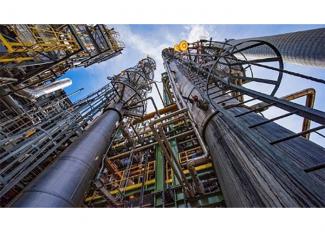By completing its “first fire” of a new natural gas infrastructure system, the National Carbon Capture Center (NCCC) is paving the way for testing of carbon capture technologies using actual natural gas-derived flue gas starting in early 2021. This achievement marks a significant milestone for the U.S. Department of Energy’s (DOE) NETL-sponsored facility as it expands the variability of carbon capture technologies for natural gas power generation, in addition to coal-fired power plants.
NCCC’s natural gas carbon capture infrastructure at Alabama Power’s Plant Gaston in Wilsonville, Alabama, includes a natural gas-fired boiler, flue gas cooler, condenser and blower. The natural gas boiler is in addition to the current capability of providing actual coal-fired flue gas from an operating pulverized coal plant. This system offers significant advantages for carbon capture technology developers to demonstrate and scale up technologies, including expanded testing windows and more flexibility.
The first fire validated the system’s ability to start up and operate as designed. John Carroll, NCCC project engineer, said the team carried out a multistep start-up process that included firing the boiler at minimum load and then ramping up the system to full load to prove its performance.
“While the system is designed to operate at a lower load to simulate a natural gas combined-cycle unit for testing, it also must operate at a higher load that is very close to coal plant conditions,” said Carroll. “We were able to put the system through its paces to prove it will operate properly at both conditions and a full range in between.”
“The natural gas addition positions our facility to meet the needs of technology developers and research institutions looking to test their advanced designs and processes outside of the lab at bench- and pilot-scale,” said John Northington, director of the NCCC. “With this new infrastructure and our highly specialized team, carbon capture innovators will have more options for moving their technologies forward.”
As the primary carbon capture research facility for DOE, the NCCC has worked with organizations from seven countries and completed approximately 115,000 hours of testing, advancing a wide range of technologies toward commercial scale. NCCC’s work reduced the projected cost of carbon capture for fossil-based power plants by a third, and further reductions are expected. The more these costs can be lowered, the more feasible it will be to deploy carbon capture technologies on a large scale, a goal NETL remains committed to achieving.
In October, DOE’s Office of Fossil Energy and NETL renewed its cooperative agreement with Southern Company to manage and operate the NCCC facility for another five years. This formally marked the project’s expansion into new areas of research to reduce greenhouse gas emissions from fossil-based power plants and to advance carbon dioxide utilization and direct air capture solutions.
“This is an exciting step both for NETL and the NCCC,” said Andrew O’Palko, with NETL’s Carbon Capture Team. “By reaching this milestone, Southern Company and NETL are getting close to making the power plants of the future possible. These are facilities that take full advantage of our abundant fossil fuel resources while doing so in a sustainable manner. It goes to show what can be achieved when a DOE national lab and private industry work together.”
Since its creation by DOE in 2009, the NCCC has become a cornerstone of U.S. innovation in the research and development of cost-effective, technically viable carbon capture technologies. Managed and operated by Southern Company, the NCCC has worked with more than 30 government, university and research organizations. By providing a unique test bed for third-party developers, the facility effectively bridges the gap between laboratory research and large-scale demonstrations.
The U.S. Department of Energy’s National Energy Technology Laboratory develops and commercializes advanced technologies that provide reliable and affordable solutions to America’s energy challenges. NETL’s work supports DOE’s mission to advance the national, economic and energy security of the United States.




